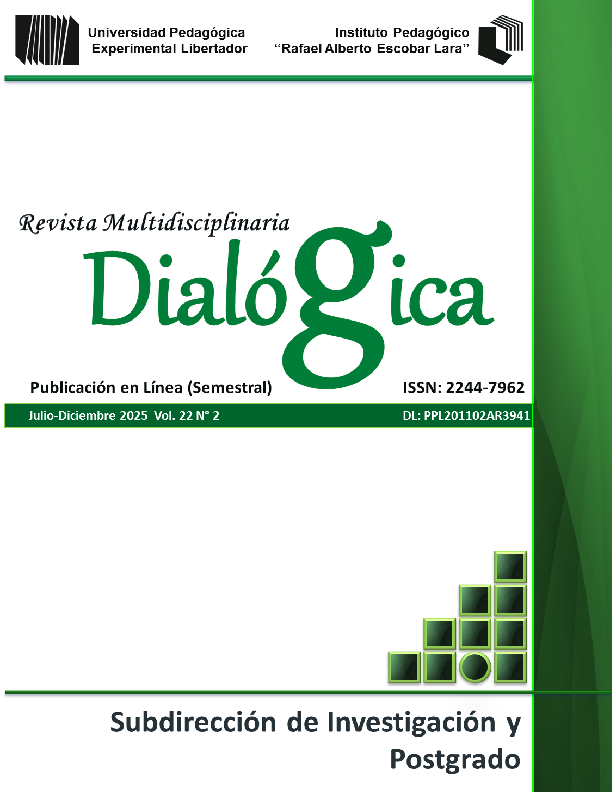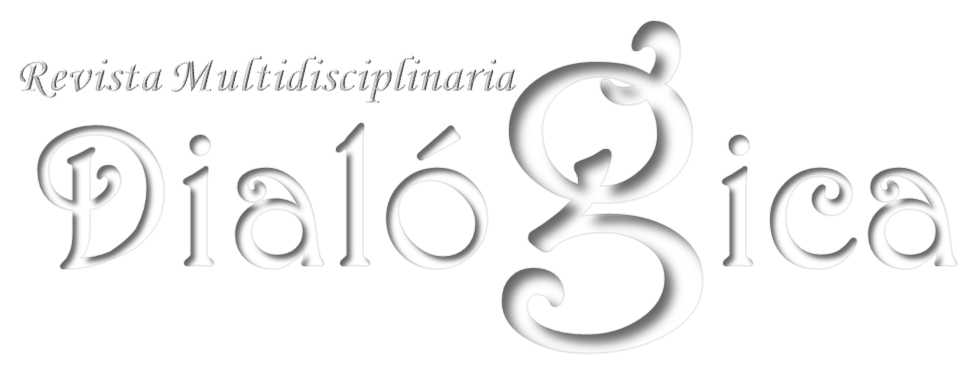Self-regulation of learning and academic performance: challenges in the COVID-19 era
DOI:
https://doi.org/10.56219/dialgica.v22i2.4113Keywords:
Learning, self-assessment, self-regulation, motivation, academic performanceAbstract
Self-regulated learning is a skill that each student personally develops to achieve knowledge. In this process, the individual is aware of the cognitive steps that allow them to identify strategies to reach their goals. This study aimed to understand the development of self-regulated learning processes and their impact on the academic performance of secondary school students in Cartagena, Colombia, within the virtual context of the COVID-19 pandemic. A qualitative approach was used, specifically the hermeneutic phenomenological method of educational practice. The research applied anecdotal accounts and conversational interviews, with an interview script as the main instrument. The findings revealed that motivation, emotion management, family support, self-assessment, and the use of ICT positively influenced self-regulated learning. These factors enhanced the students' learning strategies, which in turn improved their academic performance.
References
Albán, J., y Calero, J. (2017). El rendimiento académico: aproximación necesaria a un problema pedagógico actual. Revista Conrado, 13(58), 213-220. https://conrado.ucf.edu.cu/index.php/conrado/article/view/498
Ayala, R. (2008). La metodología fenomenológico-hermenéutica de M. Van Manen en el campo de la investigación educativa. Posibilidades y primeras experiencias. Revista de Investigación Educativa, 26(2), 409 – 430. https://www.redalyc.org/pdf/2833/283321909008.pdf
Coll, C. (1999). La concepción constructivista como instrumento para el análisis de las prácticas escolares. En Coll, C. Psicología de la instrucción: la enseñanza y el aprendizaje en la Educación Secundaria. Cuadernos del Profesorado N° 15, 15-43. ICE / HORSORI.
Denzin, N., y Lincoln, Y. (2008). Introduction: The discipline and practice of qualitative research. En N. Denzin y Y. Lincoln (Eds.), The landscape of qualitative research (3ª ed., pp. 1-43). Sage Publications.
Diez, A. y Cabrera, L. (2021). La educación virtual en tiempos de la pandemia COVID-19: Un reto docente. CIENCIAMATRIA, 7(13), 4-26. https://www.cienciamatriarevista.org.ve/index.php/cm/article/view/469 DOI: https://doi.org/10.35381/cm.v7i13.469
Kolb, B. (1984). Functions of the frontal cortex of the rat: a comparative review. Brain research reviews, 8(1), 65-98. DOI: https://doi.org/10.1016/0165-0173(84)90018-3
García, I., y Bustos, R. (2021). La autorregulación del aprendizaje en tiempos de pandemia: una alternativa viable en el marco de los procesos educativos actuales. Revista Diálogos sobre Educación, 12(22). 1-27. https://www.scielo.org.mx/scielo.php?script=sci_arttext&pid=S2007-21712021000100014
Lara, S., y Colina, L. (2023). La anécdota pedagógica: una herramienta heurística desde la perspectiva de Max van Manen. Revista gaceta pedagógica. 47, 43-64. DOI: https://doi.org/10.56219/rgp.vi47.2343
Mccombs, B. y Marzano, R. (1990). Putting the self in self-regulated learning: The self as agent in integrating will and skill. Revista Educational Psychologist, 25, 51-69. https://www.tandfonline.com/doi/abs/10.1207/s15326985ep2501_5 DOI: https://doi.org/10.1207/s15326985ep2501_5
Panadero, E. y Tapia, J. (2014). ¿Cómo autorregulan nuestros alumnos? Revisión del modelo cíclico de Zimmerman sobre autorregulación del aprendizaje. Revista Anales de Psicología 30(2), 450-462. https://www.redalyc.org/pdf/167/16731188008.pdf DOI: https://doi.org/10.6018/analesps.30.2.167221
Pintrich, P. (2000). The role of goal orientation in self-regulated learning. En Bokaerts, Pintrich y Zeidner. (Ed.), Handbook of self-regulation. 451-529. Academic Press. https://www.sciencedirect.com/science/article/abs/pii/B9780121098902500433 DOI: https://doi.org/10.1016/B978-012109890-2/50043-3
Real Academia Española. (2023). Diccionario de la lengua española (Edición del tricentenario). https://dle.rae.es/
Rinaudo, M., y Vélez, G. (1996). Aprendizaje cooperativo y comprensión de la lectura: Una experiencia con estudiantes universitarios. Revista Lectura y Vida, 17(1), 3-16. http://www.lecturayvida.fahce.unlp.edu.ar/numeros/a17n1/17_01_Rinaudo.pdf
Sarmiento B., D. (2024). Incidencia de los procesos de autorregulación de los aprendizajes en el rendimiento académico. Una mirada desde la virtualidad y la presencialidad. [Tesis doctoral, Universidad Pedagógica Experimental Libertador, Instituto Pedagógico de Caracas]. https://espacio.digital.upel.edu.ve/index.php/TD/article/view/1580
Shanker, S. (2013). Calma, Atención y Aprendizaje: Estrategias de autorregulación en el aula. CEREBUM Ediciones
Van Manen, M. (2003). Investigación Educativa y Experiencia vivida. Ciencia humana para una pedagogía de la acción y de la sensibilidad. Idea Books
Winne, H., y Hadwin, F. (1998). Studying as self-regulated engagement in learning. En D. Hacker,J. Dunlosky y A. Graesser (Ed.), Metacognition in educational theory and practice (pp. 277-304). Hillsdale, NJ: Erlbaum.
Zimmerman, B. J. (1989). A social cognitive view of self-regulated academic learning. Journal of Educational Psychology, 81(3), 329-339. DOI: https://doi.org/10.1037//0022-0663.81.3.329
Zimmerman, B. (2000). Autoeficacia: un motivo esencial para aprender. Psicología Educativa Contemporánea Journal. 25 (1), 82-91.
Zimmerman, B. y Martínez, P. (1986). Development of a structured interview for assessing student use of self-regulated learning strategies. American Edwucational Research Journal, 23(4), 614-628. https://journals.sagepub.com/doi/abs/10.3102/00028312023004614 DOI: https://doi.org/10.3102/00028312023004614
Published
How to Cite
Issue
Section
License
Copyright (c) 2025 Darling del Socorro Sarmiento Baena, Yaritza Cova Jaime

This work is licensed under a Creative Commons Attribution-NonCommercial-ShareAlike 4.0 International License.


 @revistadialogica
@revistadialogica DialogicaUPEL
DialogicaUPEL RevistaDialogicaUPELMaracay
RevistaDialogicaUPELMaracay dialógicaupel@gmail.com
dialógicaupel@gmail.com dialogicaupel.blogspot.com
dialogicaupel.blogspot.com https://issuu.com/dialogicaupel
https://issuu.com/dialogicaupel https://revistas.upel.edu.ve/index.php/dialogica/
https://revistas.upel.edu.ve/index.php/dialogica/









